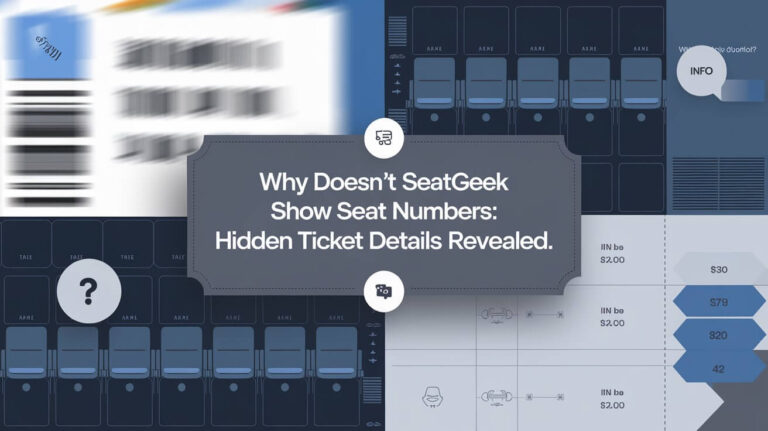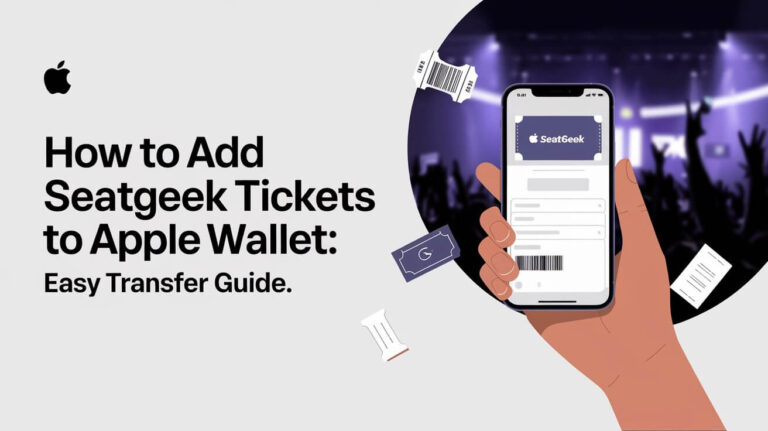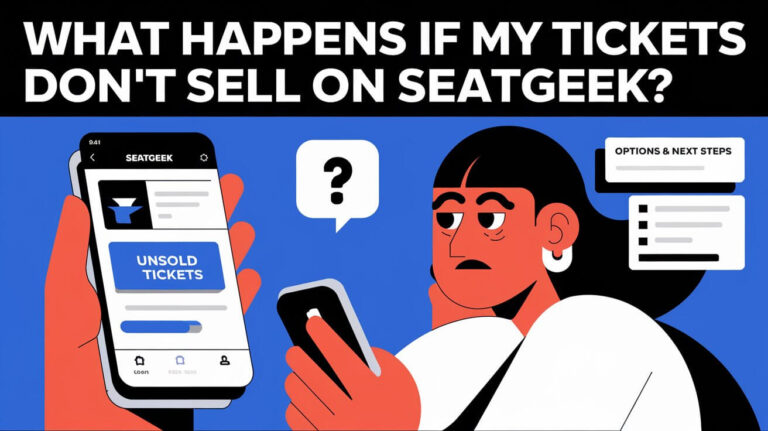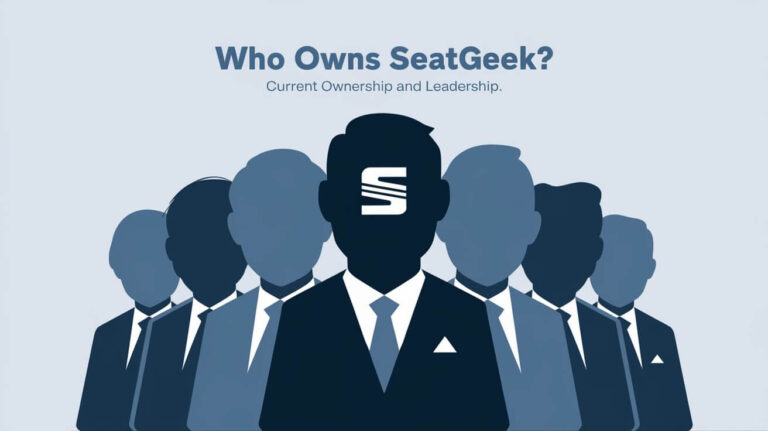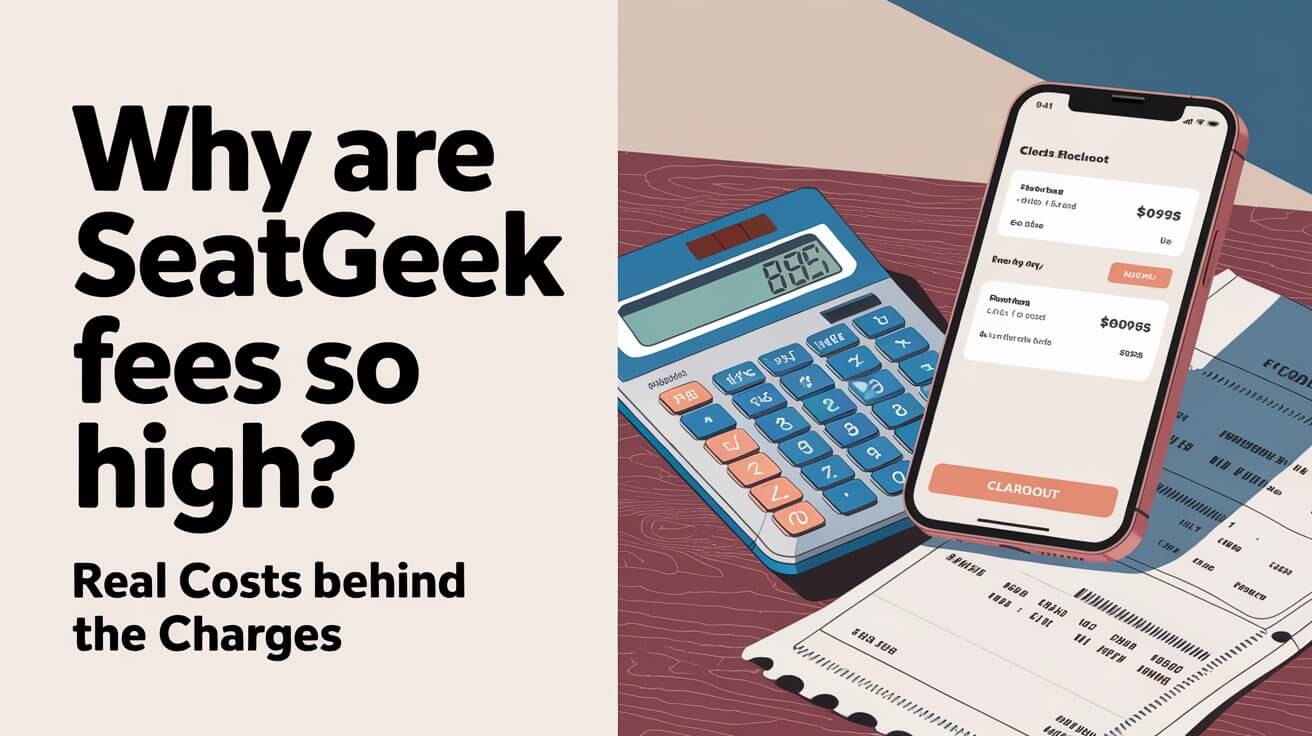
In the world of event ticketing, many wonder why SeatGeek fees are so high. SeatGeek is a top ticket aggregator known for its easy-to-use platform and features like Deal Score. But, its service fees can really add up, often between 10% to 25% of the ticket price.
So, what’s the reason behind these fees? And how can you find the best deals without getting caught in the trap of high costs? Let’s explore these questions together.
Basic Components of SeatGeek Pricing Structure
When you buy tickets on SeatGeek, you’ll see a pricing structure with several parts. These parts add up to the total cost of getting event tickets through SeatGeek.
Service Fee Components
SeatGeek has a service fee, which is a percentage of the ticket price. This fee is usually between 10% and 25%. It covers the cost of customer support, keeping the platform running, and features that make your experience better.
Delivery Fee Variations
SeatGeek also has delivery fees that change based on how you want your tickets. You can choose e-tickets, have them mailed, or pick them up. Each option has its own delivery charge.
Payment Processing Charges
The last part of SeatGeek’s pricing is the payment processing fee. This fee is for the cost of using credit cards for secure and easy ticket purchases.
| Pricing Component | Range/Details |
|---|---|
| Service Fee | 10% to 25% of ticket price |
| Delivery Fee | Varies by delivery method (e-ticket, mail, will-call) |
| Payment Processing Fee | Covers credit card transaction costs |
These fees make up SeatGeek’s pricing structure. They help the platform run smoothly, offer a great user experience, and ensure safe ticket transactions.
Why Are Seatgeek Fees So High
Many people wonder about the seatgeek markup when buying tickets online. The online ticketing platform charges high fees. But, there are good reasons behind these costs.
The cost of tickets depends on the event type and its popularity. Events that are in high demand and have premium seats cost more. SeatGeek invests in technology, customer service, and partnerships. These investments add to the ticket price.
“SeatGeek does not have hidden fees and bundles any additional charges into the final ticket price,” explained a customer service representative. “Customers can request a waiver of additional charges or hidden fees by contacting our support team or using special promo codes.”
Some people still worry about SeatGeek’s pricing being clear. New York law now requires ticket sellers to show all fees upfront. But, some say SeatGeek’s “all-in” pricing isn’t fully transparent.
- SeatGeek, along with Live Nation and Ticketmaster, announced an all-in pricing strategy with President Joe Biden.
- New York passed legislation requiring ticketing companies to show all fees upfront and disclose the original face value of resold tickets.
- But, SeatGeek’s “all-in” prices in New York do not always show the full ticket price plus fees immediately.
The high fees on SeatGeek reflect the ticketing industry’s complex nature. As SeatGeek deals with these issues, ticket prices and rules might change.
Ticket Price Markup and Operational Costs
Seatgeek’s costs play a big role in ticket prices. They spend a lot on keeping their site easy to use and on new tech. These costs show up as fees for customers.
Platform Maintenance Expenses
Keeping the ticketing smooth for users costs a lot. Seatgeek updates and fixes bugs often. They also work on security. These costs add up and affect ticket prices.
Technology Infrastructure Investments
Seatgeek’s tech, like mobile apps and Spotify, is a big investment. They also work with event places and ticket sellers. These efforts cost money, which goes to customers as fees.
Customer Support Operations
Seatgeek’s support team helps with ticket problems and refunds. Keeping this team running costs money. These costs are part of what makes tickets more expensive.
Even though Seatgeek’s costs are high, they aim to give a great experience. Knowing these costs helps users understand the real price of tickets.
Primary vs Secondary Market Impact on Fees
SeatGeek works in both the primary and secondary ticket markets. Each market affects the company’s fees differently. Primary tickets, sold directly by event organizers, have fixed fees. But, the secondary market, where tickets are resold, can have higher fees due to markups and extra charges.
The platform’s role in both markets shapes its pricing strategies. This can lead to higher costs for buyers. As demand for tickets grows, the secondary market gets busier. Resellers then charge more, making SeatGeek’s fees go up too.
| Metric | Primary Ticket Market | Secondary Ticket Market |
|---|---|---|
| Ticket Pricing | Fixed service and delivery fees | Increased markups and service charges |
| Demand Dynamics | Influenced by event organizers | Driven by reseller and consumer behavior |
| SeatGeek’s Role | Facilitating direct sales from event organizers | Enabling ticket resale and capturing a portion of higher prices |
The mix of primary and secondary markets makes pricing complex for SeatGeek. While primary fees are more set, secondary market influence can raise costs. This might make people think SeatGeek’s fees are too high.
SeatGeek’s Revenue Generation Model
SeatGeek is a top online ticketing platform. It has a unique way of making money that goes beyond just service fees on tickets. The company uses different ways to make money and meets the growing need for easy and user-friendly ticketing.
Service Fee Distribution
At the heart of SeatGeek’s money-making plan are the service fees on each ticket sold. These fees are a big part of the company’s income. They help cover costs and make SeatGeek profitable, which is key to its success.
Partnership Revenue Streams
SeatGeek works with many event organizers, sports teams, and venues. This partnership brings in extra money. They earn commissions on ticket sales and also make money from ads and sponsorships. These partnerships help make SeatGeek’s income more stable.
Advertising Income Sources
SeatGeek also makes money from ads and data licensing. Its big user base and targeted ads attract brands and event organizers. This adds to SeatGeek’s income. The data from ticket sales and user behavior can also be sold, providing more money.
SeatGeek’s mix of service fees, partnerships, and ads lets it grow in the event ticketing market. By having different ways to make money, SeatGeek is ready to face competition and keep growing in the online ticketing industry.
Market Competition and Price Positioning
SeatGeek faces tough competition in the online ticket market. It competes with big names like StubHub and Ticketmaster. Each has its own fees and pricing plans, affecting what buyers pay.
SeatGeek focuses on new features and a better user experience. This might mean higher fees for some. But, it must keep its prices in check to stay competitive and profitable.
A 2018 U.S. Government Accountability Office report showed fees ranging from 13% to 58% of ticket prices. This highlights how fees can vary greatly. It shows how competitive forces shape ticket prices.
SeatGeek uses its model to offer more choices and clear prices. This aims to change the industry’s often unclear fee practices. It wants to give customers more options and clear pricing.
“Fees added by ticketing platforms were often hidden until the end of the transaction process in certain cases, according to a 2021 study.”
As the market changes, so might rules like the TICKET Act in the U.S. SeatGeek’s place in this market will be key to its success. It will also affect how much buyers pay.
Dynamic Pricing Effects on Service Charges
SeatGeek uses dynamic pricing, which means ticket prices change with demand. This approach helps make more money but can lead to higher fees. When demand is high, like during peak seasons or for popular events, prices and fees go up.
Peak Season Pricing
In 2020, the average price for baseball tickets on SeatGeek was $81, a 40% jump from 2019. A family of four could spend $253 on an MLB game, including food, drinks, parking, and souvenirs, according to a 2021 report. The Toronto Blue Jays are the priciest at $461.70, while the Arizona Diamondbacks are the cheapest at $144.25.
Demand-Based Fee Adjustments
Service charges can change a lot based on how popular an event is and when you buy tickets. The NFL Fan Cost Index shows a family of four could spend $568.18 on an NFL game in 2021. The Las Vegas Raiders are the most expensive at $778.56, and the Cincinnati Bengals are the least at $437.30.
| Sport | Average Ticket Price | Average Family of Four Cost | Most Expensive Team | Least Expensive Team |
|---|---|---|---|---|
| MLB | $81 | $253 | Toronto Blue Jays ($461.70) | Arizona Diamondbacks ($144.25) |
| NFL | N/A | $568.18 | Las Vegas Raiders ($778.56) | Cincinnati Bengals ($437.30) |
| NHL | $94 | $376 | N/A | N/A |
| NBA | $94 (avg), $159 (high-profile teams) | N/A | N/A | N/A |
Venue Agreements and Their Cost Impact
Venue agreements are key in ticket pricing. SeatGeek works with event organizers and venues, leading to specific fees. These fees can greatly affect ticket prices.
SeatGeek’s deals with some venues or teams mean higher fees. This is because they get guaranteed access to tickets for popular events. The cost of these deals is passed on to customers through service fees.
The type of venue and agreements also play a part in ticket prices. For example, some venues might ask SeatGeek to cover extra costs like maintenance or security. These costs are added to service fees, making tickets more expensive on SeatGeek.
It’s important for customers to understand how venue partnerships affect ticket prices. Knowing this can help them find better deals when buying tickets through SeatGeek.
Price Transparency and Hidden Costs
Buying tickets can be tough, thanks to SeatGeek’s fee structure. Unlike some sites, SeatGeek doesn’t include fees upfront. This can surprise you with extra costs at checkout, making the total seem higher than expected.
Fee Disclosure Methods
How SeatGeek discloses fees has raised questions. Studies show surprise fees can add 21% to 58% to ticket costs. While SeatGeek doesn’t have hidden fees, when fees are revealed can affect how happy you are with your purchase.
Total Cost Breakdown
SeatGeek’s pricing can be unclear, which is frustrating. A study showed a NHL game ticket had a $61 processing fee and a $3 order fee. This added 22% to the ticket price. Lawsuits also claim SeatGeek charged a 35% hidden fee for Maluma concert tickets.
The practice of “drip pricing,” where fees are added later, worries consumer groups. The TICKET Act aims to require clear total prices and fee breakdowns before you buy.
“Junk fees” in the ticket industry, and across various sectors, have been a growing concern for regulators and consumers alike. The Biden Administration has taken steps to address these hidden costs, including actions against junk fees in financial services, healthcare, and rental housing.”
As the ticketing world changes, being open and fair with prices is key. It helps build trust and ensures a good experience for everyone.
Ticket Reseller Influence on Final Pricing
Resellers and brokers on SeatGeek change ticket prices a lot. They buy tickets in bulk and sell them for more money. This makes tickets more expensive for everyone.
For big events, the fight for tickets is intense. Resellers grab lots of tickets and sell them for a lot more. This is called ticket scalping and makes prices seem too high on SeatGeek.
SeatGeek takes a part of the resale price as a fee. But most of the extra cost comes from the resellers. This makes prices go up. It’s a tricky situation for SeatGeek, offering more choices but also higher prices.
| Statistic | Percentage |
|---|---|
| Drip pricing strategy leads to approximately 21% more spending by customers. | 21% |
| Customers who weren’t shown fees until checkout spent about 21% more and were 14% more likely to complete a purchase. | 21% and 14% |
| Customers who were not initially shown fees were about 5% more likely to purchase tickets that were more expensive than those who saw all-inclusive prices from the start. | 5% |
| Hidden-fee buyers spent more on tickets located closer to the field or event stage, accounting for a quarter of the 21% spending increase. | 25% |
| Users subjected to hidden fees were 45% less likely to complete a purchase when fees were disclosed at checkout. | 45% |
The ticket market’s effect on SeatGeek’s prices is complex. It shows the challenge of balancing choice and clear prices. SeatGeek must find ways to reduce reseller impact while keeping tickets affordable for users.
Consumer Protection and Pricing Regulations
The world of event ticketing is always changing. Laws and regulations play a big role in this change. They affect how ticket prices are set and how fees are shown on sites like SeatGeek. In different places, rules have been made to stop high prices and make sure fees are clear.
New York was the first to ban hidden costs for live events in 2022. Now, ticket sellers must show the full price upfront. The Biden administration is also cracking down on “junk fees” in industries like cable and hotels. This push for clear prices is also happening in the ticketing world, with new rules to show all fees.
Many people have complained about high fees for online tickets. Almost 7,000 wrote to the Federal Trade Commission (FTC) about it. This led to checks on companies like Ticketmaster and Live Nation. Now, ticket sites promise to show the full ticket price, so customers know all costs before buying.
Common Questions
What are the basic components of the SeatGeek pricing structure?
SeatGeek’s pricing includes service fees from 10% to 25%. There are also delivery fees and payment processing fees. These cover the cost of credit card transactions.
Why are SeatGeek fees so high?
Fees are high due to event type, seat location, and ticket demand. The platform’s tech investment and customer service also play a role.
How do SeatGeek’s operational costs impact ticket pricing?
Costs like platform maintenance and customer support raise ticket prices. These expenses are reflected in service fees for consumers.
How do primary and secondary ticket markets affect SeatGeek’s fee structure?
SeatGeek works in both markets. Primary tickets have fixed fees, while secondary market tickets have higher fees. This affects its overall fees and pricing.
What is SeatGeek’s revenue model, and how does it impact ticket pricing?
SeatGeek makes money from service fees, ads, sponsorships, and affiliate marketing. Deals with event organizers can also impact ticket prices.
How does market competition affect SeatGeek’s fee structure?
SeatGeek competes with StubHub and Ticketmaster. Its focus on features and user experience may justify higher fees. Market competition also shapes its pricing.
How does dynamic pricing affect SeatGeek’s service charges?
Dynamic pricing means prices and fees change with demand. During peak times, prices and fees can rise to maximize revenue.
How do venue agreements impact the final ticket price on SeatGeek?
Agreements with venues can include specific fees. Some venues add extra charges. Exclusive deals can also lead to higher fees.
How transparent is SeatGeek’s fee structure?
SeatGeek’s fees can seem hidden, revealed late in the purchase. This can make the total cost seem higher, even without hidden fees.
How do ticket resellers influence pricing on SeatGeek?
Resellers and brokers on SeatGeek drive up prices. They buy tickets in bulk and resell at a markup, affecting high-demand event prices.
How do consumer protection laws and regulations impact SeatGeek’s fee structure?
Laws and regulations can change ticket pricing and fees. Some areas limit fees or require clear disclosure, affecting SeatGeek’s pricing and transparency.



